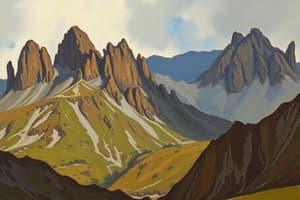Podcast
Questions and Answers
What is the main difference between weathering and erosion?
What is the main difference between weathering and erosion?
- Weathering involves reducing landform's mass, while erosion involves moving material to another location. (correct)
- Weathering creates soil, while erosion does not affect soil composition.
- Weathering only occurs due to chemical processes, while erosion only occurs due to physical processes.
- Weathering is a fast process, while erosion is a slow process.
How does chemical weathering differ from physical weathering?
How does chemical weathering differ from physical weathering?
- Chemical weathering occurs due to human activities, while physical weathering occurs naturally.
- Chemical weathering only affects sedimentary rocks, while physical weathering affects all types of rocks.
- Chemical weathering is a fast process, while physical weathering is a slow process.
- Chemical weathering involves the breakdown of rock and soil due to interactions with water, acid, and gases, while physical weathering refers to the impact of mechanical or physical processes. (correct)
How does carbon dioxide contribute to chemical weathering?
How does carbon dioxide contribute to chemical weathering?
- Carbon dioxide accelerates erosion by moving rocks quickly down slopes.
- Carbon dioxide increases soil fertility by providing nutrients to plants.
- Carbon dioxide solidifies sedimentary rocks into harder formations.
- Carbon dioxide in the air combines with water in the cloud to create acid rain, which dissolves sedimentary rocks. (correct)
Why is human activity mentioned in the context of chemical weathering?
Why is human activity mentioned in the context of chemical weathering?
What contributes to the creation of the best soil according to the text?
What contributes to the creation of the best soil according to the text?
What is one example provided for chemical weathering in the text?
What is one example provided for chemical weathering in the text?
Flashcards are hidden until you start studying




